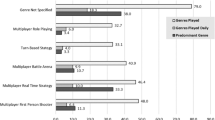Abstract
A previous investigation from Korea indicated that religion might modulate gaming behavior (Kim and Kim in J Korean Acad Nurs 40:378–388, 2010). Our present study aimed to investigate whether a belief in God, practicing religious behavior and religious denomination affected gaming behavior. Data were derived from a Western cohort of young men (Cohort Study on Substance Use Risk Factors, n = 5990). The results showed that a stronger belief in God was associated with lower gaming frequency and smaller game addiction scale scores. In addition, practicing religiosity was related to less frequent online and offline gaming. Finally, Christians gamed less frequently and had lower game addiction scale scores than subjects without religious denomination. In the future, these results could prove useful in developing preventive and therapeutic strategies for the Internet gaming disorder.

Similar content being viewed by others
References
American Psychiatric Association. (2013). Diagnostic and statistical manual of mental disorders. Washington, DC: American Psychiatric Association.
Blazer, D. (2012). Religion/spirituality and depression: What can we learn from empirical studies? American Journal of Psychiatry, 196(1), 10–12.
Brewer G, Robinson S, Sumra A, Tatsi E, Gire N. (2015). The influence of religious coping and religious social support on health behavior, health status and health attitudes in a British Christian sample. Journal of Religion and Health, 54, 2225–2234.
Connors, G. J., Tonigan, J. S., & Miller, W. R. (1996). A measure of religious background and behavior for use in behavior change research. Psychology of Addictive Behaviors, 10, 90–96.
Conover, W. J., & Iman, R. L. (1981). Rank transformations as a bridge between parametric and nonparametric statistics. The American Statistician, 35, 12–129.
Davydov, D. M., Steward, R., Ritchie, K., & Chaudieu, I. (2010). Resilience and mental health. Clinical Psychology Review, 30, 479–495.
Ghandour, L. A., & El Sayed, D. S. (2012). Gambling behaviors among university youth: Does one’s religious affiliation and level of religiosity play a role? Psychology of Addictive Behaviors, 27, 279–286.
Gmel, G., Mohler-Kuo, M., Dermota, P., Gaume, J., Bertholet, N., Daeppen, J. B., & Studer, J. (2013). Religion is good, belief is better: Religion, religiosity, and substance use among young Swiss men. Substance Use and Misuse, 48, 1085–1098.
Haber, J. R., & Jacob, T. (2009). Mediation of family alcoholism risk by religious affiliation types. Journal of Studies on Alcohol and Drugs, 4, 877–889.
Huber, S., & Huber, O. W. (2012). The centrality of religiosity scale (CRS). Religions, 3, 710–724.
Jacobs, M., Miller, L., Wickramaratne, P., Gameroff, M., & Weissman, M. M. (2012). Family religion and psychopathology in children of depressed mothers: ten-year follow-up. Journal of Affective Disorders, 136, 320–327.
Kasen, S., Wickramaratne, P., Gameroff, M. J., & Weissman, M. M. (2012). Religiosity and resilience in persons at high risk for major depression. Psychological Medicine, 42, 509–519.
Kim, K. S., & Kim, K. H. (2010). A prediction model for internet game addiction in adolescents: using a decision tree analysis. Journal of Korean Academy of Nursing, 40, 378–388.
King, M., Marston, L., McManus, S., Brugha, T., Meltzer, H., & Bebbington, P. (2012). Religion, spirituality and mental health: results from a national study of English households. British Journal of Psychiatry, 202, 68–73.
Koenig, H. G., Berk, L. S., Daher, N. S., Perce, M. J., Bellinger, D. L., Robins, C. J., et al. (2014). Religious involvement is associated with greater purpose, optimism, generosity and gratitude in persons with depression and chronic illness. Journal of Psychosomatic Research, 77, 135–143.
Kuntsche, S., Knibbe, R. A., & Gmel, G. (2009). Social roles and alcohol consumption: A study of 10 industrialised countries. Social Science and Medicine, 68, 1263–1270.
Lam, D. (2006). The influence of religiosity on gambling participation. Journal of Gambling Studies, 22, 305–320.
Lampen-Imkamp, S., & te Wild, B. T. (2009). Phänomenologie, Diagnostik und Therapie der Internet- und Computerabhängigkeit. In J. Hardt, U. Cramer-Düncher, & M. Ochs (Eds.), Verloren in virtuellen Welten. Göttingen: Vandenhoeck & Ruprecht.
Lemmens, J. S., Valkenburg, P. M., & Peter, J. (2009). Development and validation of a game addiction scale for adolescents. Media Psychology, 12, 77–95.
Michalak, L., Trocki, K., & Bond, J. (2007). Religion and alcohol in the US National Alcohol Survey: How important is religion for abstention and drinking? Drug and Alcohol Dependence, 87, 268–280.
Miller, L., Davies, M., & Greenwald, S. (2000). Religiosity and substance use and abuse among adolescents in the National Comorbidity Survey. Journal of the American Academy of Child and Adolescent Psychiatry, 39, 1190–1197.
Moreira-Almeida, A., Neto, F. L., & Koenig, H. G. (2006). Religiousness and mental health: A review. Revista Brasileira de Psiquiatria, 28, 242–250.
Piko, B. F., Kovacs, E., Kriston, P., & Fitzpatrick, K. M. (2012). “To believe or not to believe?” Religiosity, spirituality, and alcohol use among Hungarian adolescents. Journal of Studies on Alcohol and Drugs, 73, 666–674.
Pokhrel, P., Sussman, S., Regmi, S. D., Hallam, J. S., Kniazev, V., & Masagutov, R. (2011). Spirituality and substance use in a sample of Russian adolescents. International Journal of Adolescent Medicine and Health, 24, 149–152.
Rehatschek, H. (2010). Entstehung eines Computerspiels. In C. Wessely & A. D. Ornella (Eds.), Religion und Mediengesellschaft. Innsbruck: Tyrolia- Verlag.
Roth, E. (1965). Das grosse Los. Oldenburg: Verlag Oldenburg.
Saucier, G., & Skrzypinska, K. (2006). Spiritual but not religious? Evidence for two independent dispositions. Journal of Personality, 14, 1259–1292.
Smith, C., & Snell, P. (2009). Souls in transition: The religious lives of young adults in America. New York: Oxford University Press.
Williams, A. L., Dixon, J., Feinn, R., & McCorkle, R. (2015). Cancer family caregiver depression: are religion-related variables important? Psychooncology, 24, 825–831.
Author information
Authors and Affiliations
Consortia
Corresponding author
Additional information
Cohort Study on Substance Use Risk Factors investigators are Gerhard Gmel and Joseph Studer.
Rights and permissions
About this article
Cite this article
Braun, B., Kornhuber, J., Lenz, B. et al. Gaming and Religion: The Impact of Spirituality and Denomination. J Relig Health 55, 1464–1471 (2016). https://doi.org/10.1007/s10943-015-0152-0
Published:
Issue Date:
DOI: https://doi.org/10.1007/s10943-015-0152-0




